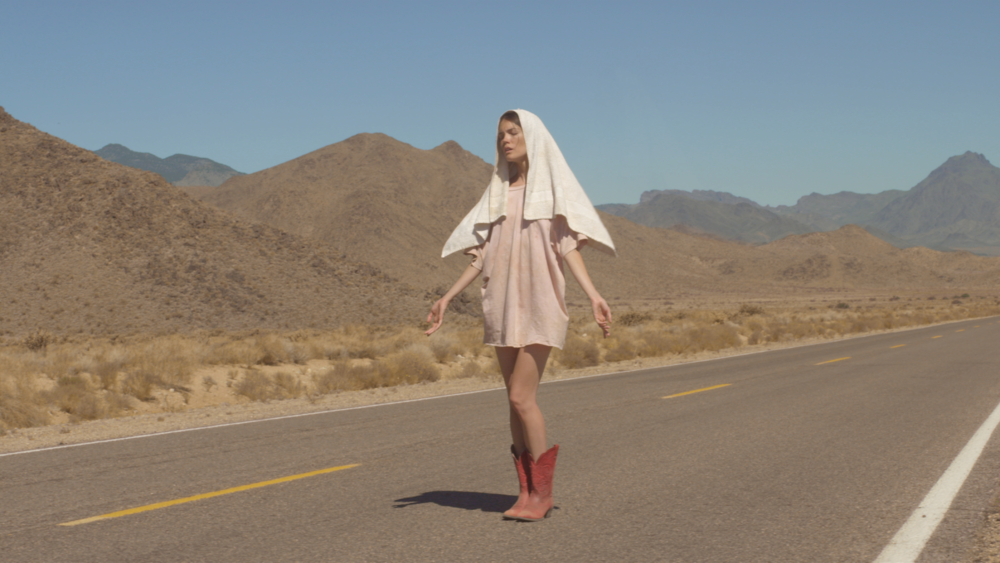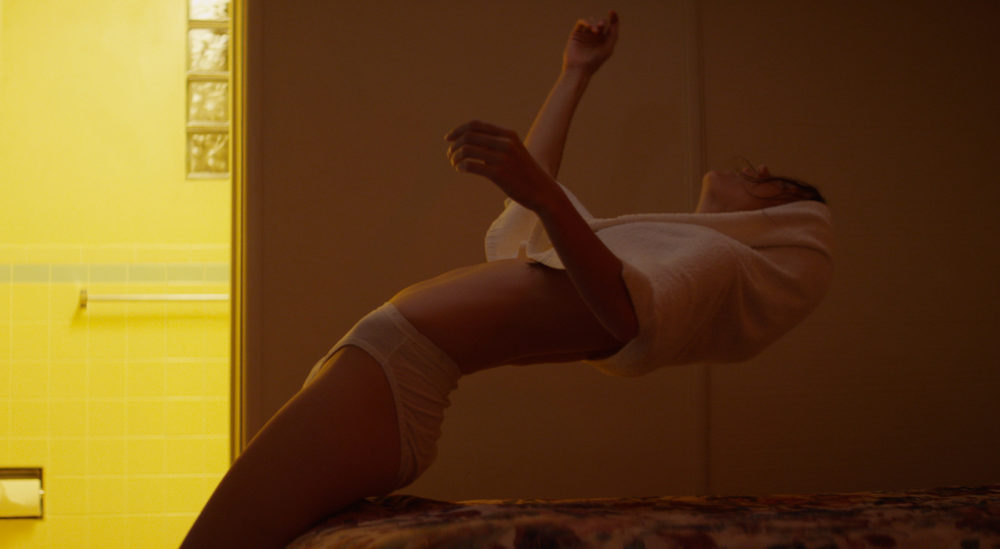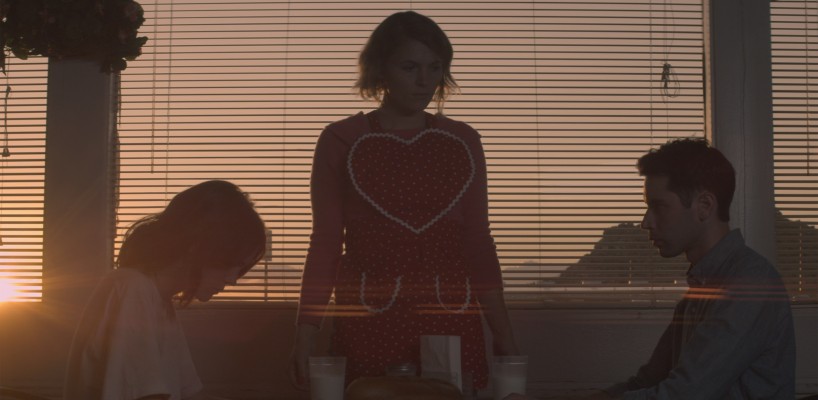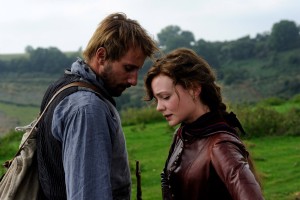
With the mini-festival Borscht 9.5 kicking off this week, Celia Rowlson-Hall’s feature film Ma will be hitting Miami for a one-night-only screening on Thursday, October 13th, at the Miami Beach Cinematheque. After watching her incredibly original debut last week, and publishing a review of her short film Prom Night, I spoke to Rowlson-Hall on the phone about her work, her influences, and what’s coming next. A large portion of the interview discussing her explorations of gender, ballet, and sexual assault in Ma is on the Miami New Times and the rest is right here for everyone to check out.
—
One of the most interesting bits of the “dying swan” dance is the imagery; one of my favorite moments being when you take the shirt and make it into a blanket for a child and then immediately turn it into an object of self-flagellation in a few movements. I’m really just fascinated in the way you choreograph every movement.
I always grew up wanting to dance. I think I’ve always had a hard time forming words, so for me, it’s like I’ve always found expression in movement. Ever since I was a little kid, I was choreographing and making dances. When I started to seriously train in dance, I remember trying to learn these movements and expressions in dance and I always felt like something was missing. I was moving my arm or appendage to create a line and I didn’t know why—but I remember being like “I want to know why I’m moving here.” And in high school is when I learned that one could be a choreographer as a profession and that kind of blew my whole world open, so I really wanted to tell stories through my dance and have there be a reason behind every motion, every action.
For me, this dying swan dance is her pain and her wanting to be otherworldly and godlike and connected to the divine, but recognizing that she’s human and that’s not possible. She’s endured violence and pain and she’s also felt love from this other person [the character of Daniel, who accompanies Ma similarly to how Joseph accompanied Mary], but she knows she’s got this journey that she must continue.
I think that we all have so much inside of us. Personally, I feel like I’ve got a million versions of me inside of me and so it’s always my goal to explore all of them. When she’s fighting on the bed, she’s fighting with the duality of self and wondering which one will win over and it questions: how many times do we stab our own selves in the back rather than other people stabbing us?
It’s natural as a filmmaker to want to put some of yourself into what you’re making and you really seem interested in exploring the performative nature of gender and the roles that women are forced to take on.
I believe you should put all of yourself into everything you do. [see Miami New Times piece for extended response for this]
The next movie I’m working on is about a gay bearded woman single-mother on a sinking island. Once again I’m going into sexuality, identity, male-female roles within the one role, physically and gayly. I read somewhere that most people are kind of obsessed with five things and will kind of keep exploring them in different ways for the rest of their life and I just know this is one of them for me.
That sounds wildly up my alley.
You and like two other people. [laughs] No, no, no, it’s funny—I was telling it to my friend and he was like, “Wow that is the least commercial pitch for a film I’ve ever heard in my life.” Yeah, that’s accurate, I’m on the right path.

You have such an attention to detail on the way movements impact how we see a character, especially in silent moments. It comes through a lot in the editing and long takes for works like Prom Night and, one scene in particular in Ma is the climactic motel sequence in Las Vegas. It’s such a perfect mixture of character anxiety depicted through both performance and filmmaking and I’d like to know about having to nail these beats as both an actress and director.
Well, I was working with a lot of my collaborators on this film years before we made it and I had my key crew on board before we even had money. So the DP [Ian Bloom] and I did so much pre-planning for this. Because I wrote the script myself, I was able to write in camera movements, which I know is a big no-no if you’re not directing. And that scene was a continuous take and I always knew it was going to be one. When I found that motel room—which is funny because it’s the last of its kind in Las Vegas ‘cause everything’s been renovated and it all looks grey and new and boring—it was this amazing gaudy place with stairs and everything, so we knew the only way to do it was a steady cam.
As the pieces came in, there were certain limitations that guided the filmmaking, but that scene in particular, we basically had a whole day or at least half a day that we dedicated to it because we wanted to be sure we got it right. We rehearsed the heck out of that and there was no AD or anything so me and the DP are placing all the women in the background, framing them, and not everybody showed up because it’s low-budget. So we had some girls run and fulfill another role and it looked like we had more people in the space and in the last scene there’s a producer and the art director, and they’re all dressed in prostitute outfits because we didn’t have enough people [laughs]. But the DP and I were always on the same page as to how we wanted to shoot this film.
Generally what would happen is we’d shoot one pass, I’d review and I would give him notes and then I would give myself notes as director to actor and go in and watch again. It was absolutely challenging, but because of all my short film experience, that was all sort of like exercise up to this big marathon. Had I not had any experience before acting in my own work, it would have probably been impossible. In the way that we really prepped and planned and rehearsed in New York, we were really ready to go, which was great because there were a million challenges there and things shifted, but at least we had created a map. Even if we went off map, it was okay because we’d agreed on something prior.
I’m always curious to know if the influences of the filmmaker are the same as what I saw in their film, so who were you drawing from for either visual or textual inspiration?
Well I will say that my biggest inspiration was obviously the Bible. I grew up quite religiously and I remember reading these Bible stories as a child and feeling the magnitude of these stories and their wild visuals as well, like imagining Jonah in the belly of the whale. Those grand images were very impressionable upon me as a child.
Pina Bausch, the choreographer, has been one of my biggest inspirations. Although when she was alive, her career was all live performance on stage, she turned her stages into worlds. Her visuals are just stunning and seeing her work really changed my life. I was like, “Oh, that’s possible on stage. What’s possible in film?” And bringing those theatrical elements to film is something I’m really interested in.
I really love the work of Yorgos Lanthimos [Dogtooth, The Lobster]; he’s a huge inspiration. Although it’s not indicative in my filmmaking, people that I’m very much attracted to are Andrea Arnold [Fish Tank, Wuthering Heights, American Honey], who I think is one of the finest most brilliant directors, ever. I also love Roy Andersson [A Swedish Love Story, “Living Trilogy”] because I love the worlds that he creates and the humor and darkness. I’m very interested in those directors who create such a tight container. The air feels just packed in there and so specific. Those are definitely a few of my heroes. I’d be curious to hear yours.

Definitely had Pina Bausch in mind, and by extension Wim Wenders as well, but not just with Pina but with Paris, Texas.
I’m so glad you bring that up. It’s so funny because literally a month before I went out to shoot, I was telling my friend about my film and he said, ‘Oh that sounds very much like Paris, Texas,” and I go, ‘Oh what’s Paris, Texas?’ and he goes, ‘Oh my gosh, watch it.’ And I watched it that night and it’s crazy because there’s similar scenes. When the brother gets in the back seat and refuses to get in the front seat and as the character develops he moves to the front, that was written in Ma as well. Even the red hats and the red shoes in the desert.
Instead of trying to change anything, I just said, ‘Whatever, this film is my spirit animal.’ And Wim Wenders’ Pina is my other spirit animal. So I went into it thinking of Pina and Paris, Texas as bookends and my little beast as the middle ground, if I can be so bold to even say that.
Some other people who popped into my head were Alejandro Jodorowsky in the religious imagery and David Lynch in some of the surrealness.
We gave Jodorowsky a nod in our priest; the costume designer did that. There’s something so—what Jodorowsky did with his priest image is made it very sort of worldwide. He really solidified the image of priest or religious in a very fashionable way and so the costume designer said we’re gonna nod to him there.
Sally Potter was the last one for me because her work is very focused on gender exploration and some of it is really performative and theatrical, like Orlando with Tilda Swinton.
Oh yeah, it’s really funny. I just watched a clip from that last night and I thought, “How have I not seen this?” Oh my gosh, cool, I can’t wait to check her out, that’s amazing.
And, to close things: who do people bring up to you in discussions about Ma and how do you feel about certain comparisons?
I think the filmmaker that I’ve gotten most for this was Antonioni actually. That’s been in a couple of reviews and I mean, hey, I’ll take any comparison like that.
I think that what I’m truly aiming to do in my work is to be my own voice and to continue to dig in and specify and understand how I can continue to explore myself in a truthful way. I guess what I’m attracted to in filmmakers is when I feel they tell stories in a way only they can do it and you feel their heartbeat. It is my only goal to keep listening to my heartbeat and hope it grows louder with more discovery and pushing. So I’m happy to be in anyone’s ranks that have done the same; it’s an honor.



 Derek
Derek
 Isabelle
Isabelle